Vitamin B12 is an essential nutrient made from a family of molecules called cobalamins. They took on this particular name because they contain an ion of the element cobalt. However, B12 is the only biological use of that specific ultra-trace element.
Every cell within the body needs Vitamin B12 to function. The human body uses B12 for amino acids, fatty acids, red blood cell production, and DNA synthesis. The nervous system relies heavily on B12 because it uses fatty acids to make the myelin sheath that protects the nerves. Like the nervous system, the circulatory system depends on B12, especially for red blood cell production.
Symptoms and Tests
Insufficient sources from a diet and “pernicious anemia” (the inability of the gut to absorb B12) can cause vitamin B12 deficiency. Excessive alcohol intake and medications (both OTC or prescriptions) can also cause a lack of B12, leading to symptoms such as:
A simple blood test can confirm Vitamin B12 deficiency and reveal the number of red blood cells, B12, and folic acid (another B vitamin). A lack of folic acid or B12 can cause similar symptoms but require different protocols. Nowadays, a monthly supplemental shot is an option for those with severe deficiencies.
Vitamin B12... With Benefits
Prevention of Birth Defects
Studies have shown that women with vitamin B12 levels lower than 250 mg/dL were three times more likely to give birth to a child with birth defects than those with adequate levels (Berkheiser).
Energy Boost
Vitamin B12 supplements are often seen as go-to products for a surge of energy. All B-vitamins play a role in your body’s energy production, though they don’t provide it themselves.
Improve Heart Health
There is a link between an increased risk of heart disease and high blood levels of amino acids called homocysteines. Studies show that vitamin B12 helps decrease homocysteine levels, which may reduce the risk of heart disease.
Many people that eat a diverse and healthy diet are not at risk of a B12 deficiency. This is because it’s pretty easy to include animal proteins, green leafy vegetables, fruits, and fortified grains to help maintain a balanced diet. Thankfully, with the right supplements, even vegans and vegetarians can also find a way to get the amount of B12 they need each day!
Sources and Servings
Vitamin B12 is the only nutrient in the human diet that must come from animal products. In fact, the best source of B12 is red and white meat, fish, and seafood. While the vitamin count isn’t as high as meat, eggs and milk also provide some dietary B12. It’s also important to note that plants do not need B12 and therefore do not contain any. The lack of this vitamin means that vegetarians and vegans need to find alternative sources.
Many people get enough B12 in their diet by eating meat, eggs, fish, and cheese. Those that don’t eat animal products can ingest fortified foods two or three times a day to aim for at least three micrograms of B12 (the recommended daily dose of B12 for adults is 2.6 mcg.). Some daily B12 supplements provide at least ten micrograms, while some weekly B12 supplements provide at least 2000 micrograms (Walsh).
Pulse’s dietary supplement, PulseFuel, features 100 micrograms of Vitamin B12 per serving as part of its full-spectrum nutrient and mineral support formula. If you’re a Pulse owner within the United States, talk to your ISR about incorporating PulseFuel into your wellness regimen or your business plan!
References
Walsh, Steven, and IVU-SCI. “What Every Vegan Should Know about Vitamin B12.” The Vegan Society Oct. 2001, www.vegansociety.com/resources/nutrition-and-health/nutrients/vitamin-b12/what-every-vegan-should-know-about-vitamin-b12
Berkheiser, Kaitlyn.9 Health Benefits of Vitamin B12, Based on Science. Healthline, Healthline Media, 14 June 2018, www.healthline.com/nutrition/vitamin-b12-benefits.












